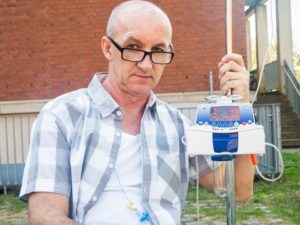Chemotherapy Still Good First-Line Option for Unresectable Epithelioid Mesothelioma
 A top mesothelioma expert says chemotherapy may still be the best first-line treatment for unresectable epithelioid mesothelioma, even though immunotherapy is an increasingly popular option.
A top mesothelioma expert says chemotherapy may still be the best first-line treatment for unresectable epithelioid mesothelioma, even though immunotherapy is an increasingly popular option.
Chemotherapy has been the primary way to treat mesothelioma since 2004. This is when the FDA approved the drug Alimta (pemetrexed). Alimta remained the only systemic treatment for asbestos cancer until 2020.
In 2020, the FDA approved a combination of the immunotherapy drugs ipilimumab (Yervoy) and nivolumab (Opdivo). But Dean Fennell, PhD, of the UK’s University of Leicester says chemotherapy is still a good choice for many unresectable epithelioid mesothelioma cases.
A Better Version of Chemotherapy?
Epithelioid mesothelioma is the most common subtype. It is also the most responsive to treatment.
For the healthiest patients, surgery and chemotherapy offer the best outcomes. People with unresectable epithelioid mesothelioma usually start with chemotherapy. The most common combination is Alimta and a platinum drug like cisplatin or carboplatin.
These drugs kill some of the mesothelioma cells, but usually not enough to eradicate tumors. Instead, they just slow down the growth. For some patients, chemotherapy does not work at all.
But there is a drug that helps chemotherapy work better. Avastin (bevacizumab) is a monoclonal antibody. It inhibits the growth of life-supporting blood vessels. Without an adequate blood supply, unresectable epithelioid mesothelioma tumors are more susceptible to chemotherapy drugs.
A 2016 French Avastin and chemotherapy study showed that it improved mesothelioma survival by 23 percent.
Dr. Fennell says this is one reason that chemotherapy – including the improved version – may be better than immunotherapy for some patients. He warns that immunotherapy should not be “a reflex replacement” for chemotherapy.
Weighing the Options for Unresectable Epithelioid Mesothelioma
The new article in the Journal of Thoracic Oncology is by Dr. Fennell and his colleague Sean Dulloo. They acknowledge what a breakthrough immunotherapy is for mesothelioma. Nivolumab and ipilimumab (ipi-nivo) harness the cancer-killing power of the patient’s own immune system to combat mesothelioma. One study shows patients live about four months longer.
But this action comes at a price. Immunotherapy can cause life-threatening side effects. Some side effects may be even more severe than side effects from chemotherapy. Also, doctors still have no reliable way to predict response to immunotherapy. Research showed people with non-epithelioid mesothelioma saw much greater benefit from ipi-nivo therapy. Using this form of therapy for unresectable epithelioid mesothelioma is more of a gamble.
On the other hand, chemotherapy with Avastin is already standard-of-care for mesothelioma in France, including for patients with unresectable epithelioid mesothelioma. And, chemotherapy offers about the same rate of disease control as ipi-nivo immunotherapy.
Until doctors have a better way to predict immunotherapy success, Drs. Fennell and Dulloo say they should still consider chemotherapy.
“Based on these arguments, it can reasonably be argued that chemotherapy with or without bevacizumab should continue to be considered an optimal first-line option in patients with E-MPM [unresectable epithelioid mesothelioma],” the article concludes.
Source:
Fennell, Dean & Dulloo, Sean, “Chemotherapy With or Without Bevacizumab Should Be the Standard of Care for First-Line Unresectable Epithelioid Mesothelioma”, January 1, 2022, Journal of Thoracic Oncology, Volume 17, Issue 1, pp. 34 – 37, https://www.jto.org/article/S1556-0864(21)02395-9/fulltext#relatedArticles





